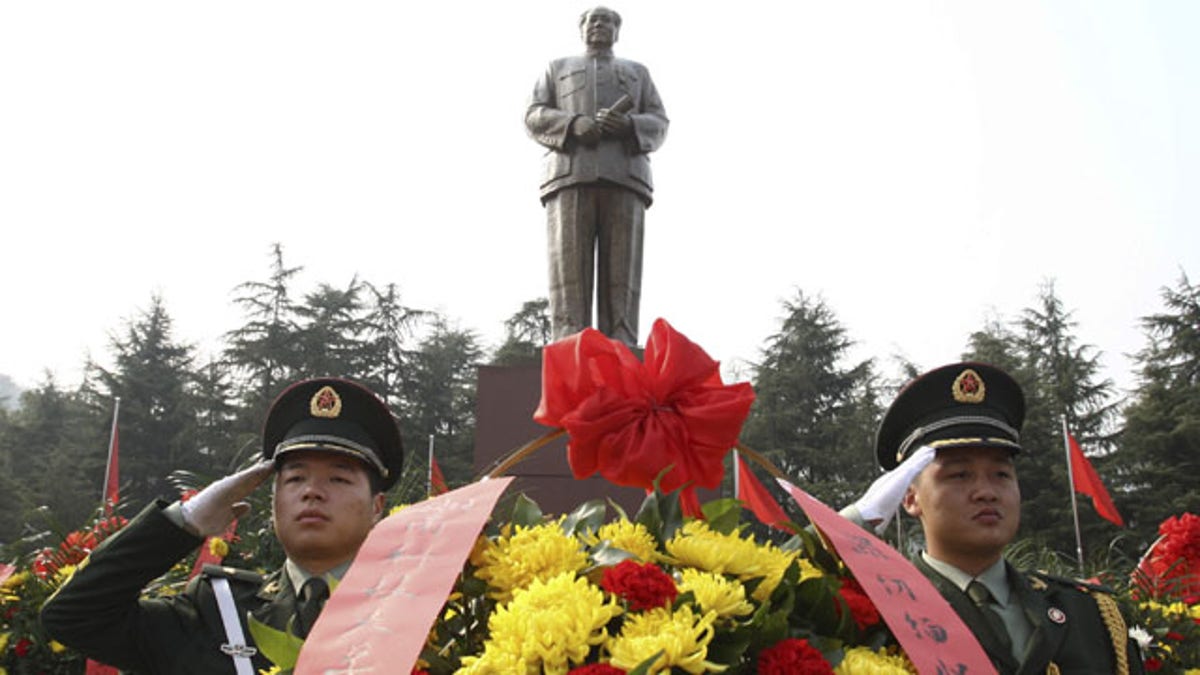
December 25, 2013: Security guards salute near wreaths in front of a statue of the late Communist leader Mao Zedong in Shaoshan, Mao's hometown, in southern China's Hunan province. (AP Photo)
BEIJING – China's leaders bowed three times before a statue of Mao Zedong on the 120th anniversary of his birth Thursday in carefully controlled celebrations that also sought to uphold the market-style reforms that he would have opposed.
The approach underscores the delicate balancing act the Communist Party leadership -- installed last year -- has to perform in managing perceptions of Mao's legacy.
As heirs of the authoritarian one-party political system imposed by Mao and his party comrades, the current leadership has a strong interest in venerating his memory in a bid to bolster their own legitimacy. But they have also pledged to undertake market reforms needed to rejuvenate a slowing economy, measures that would have been anathema to Mao.
President and Communist Party chief Xi Jinping and other top leaders paid tribute to the founder of the communist state with a visit to his mausoleum on Tiananmen Square in the heart of the capital, Beijing, the official Xinhua News Agency said.
The leaders "revered" Mao's embalmed body which lies in state in the mausoleum and "jointly recalled the glorious achievements of comrade Mao Zedong," Xinhua reported.
In a sign of the relatively understated approach the party is taking with the anniversary, there was no mention of Mao's birthday on the front page of the party's flagship People's Daily.
On page seven, though, the paper hailed Mao as a brilliant "proletarian revolutionary, strategist and theorist," in a full-page commentary. It was, however, accompanied by an editorial that said the "best commemoration" of Mao would be to keep advancing economic reforms that were launched by his successor.
Censors appeared to be busy scrubbing criticism of Mao off China's social media sites, with messages that questioned his legacy disappearing within minutes of being posted. But the views of liberal commentators and intellectuals were still circulating widely on a popular smartphone messaging app, WeChat.
"Speaking of Mao's legacy, it at least includes: the silencing of public opinion, a regime that will never be elected, the harmonious cooperation of the three powers of government, and the creation of a production line of wrongful convictions," wrote ex-government adviser Bao Tong in a recent essay that was being shared on WeChat.
"Of which the most important is undoubtedly power that leads everything," Bao wrote. "With it, one can possess the manpower and fighting strength of hundreds of millions."
Under Mao's leadership, China lurched between industrialization drives and violent political campaigns that left tens of millions dead before he died in 1976 and his successors began their free market experiments.
The official commemorations have avoided specific discussion of Mao's central role in China's worst post-war tragedies: the Great Leap Forward and Cultural Revolution, in which millions died from starvation and persecution. The People's Daily noted only that the party regarded Mao's mistakes in his later years as those made by a "remarkable revolutionary and Marxist."
The run-up to the anniversary has included dozens of exhibitions, concerts and television specials. On Thursday, the party's Central Committee held a symposium at the Great Hall of the People, Xinhua said without providing much detail.
Mao remains a strong symbolic presence, though not nearly as ubiquitous he was during his lifetime. Thousands of Chinese tourists line up daily to view his embalmed body at the mausoleum, which has also undergone renovation.
His image graces almost all bank notes from 1 to 100 yuan, and Chinese studios crank out a steady flow of movies and television series based on highly sterilized versions of his life and the party's history.
